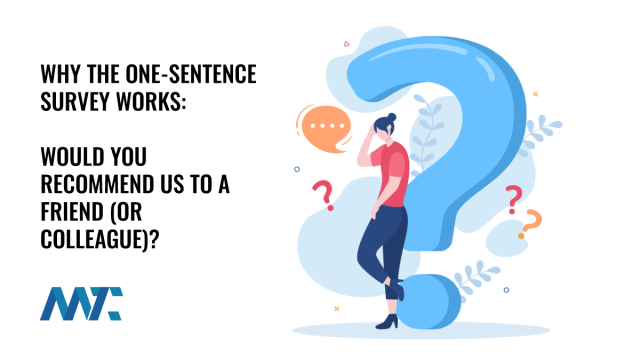Would you recommend us to a friend (or colleague)?
This question has become a gold standard for gauging customer sentiment. Here, we delve into why this question is so impactful in both B2B and B2C contexts, why it outshines lengthy surveys, and how it can be integrated into a broader customer feedback strategy.
The Origins of the One-Sentence Survey
The concept of using this question was popularized by Fred Reichheld, a consultant at Bain & Company, in his book The Ultimate Question. Reichheld introduced this question as the cornerstone of the Net Promoter System (NPS), designed to measure customer loyalty and predict business growth. He demonstrated that customer’s willingness to recommend a brand strongly indicates their overall satisfaction and likelihood of staying loyal.
Reichheld’s research revealed that companies with higher NPS scores grow faster and outperform their competitors. By focusing on this single, impactful question, businesses could cut through the noise of complex surveys and zero in on the metric that matters most: advocacy. Over time, this approach has been adopted across industries for its simplicity, effectiveness, and scalability.
Why The One-Sentence Survey Question Works
Using terms like friend and colleague carries significant psychological weight. For B2C brands, friend evokes trust and emotional connection, while for B2B settings, colleague emphasizes professional credibility and responsibility. These words resonate deeply with respondents, tapping into personal and professional stakes. They prompt individuals to carefully consider the broader implications of their recommendation carefully, ensuring thoughtful and meaningful responses.
Additionally, the question leverages the concept of social proof. Humans naturally value the opinions of their peers, and when asked to evaluate their likelihood of recommending, they subconsciously weigh the potential outcomes of a poor recommendation. This introspection encourages honest feedback while revealing opportunities for improvement.
For B2B Audiences
Business-to-business relationships often hinge on trust, reliability, and perceived value. By asking whether a client would recommend a company to a colleague, you’re indirectly assessing:
Trustworthiness: Would they stake their professional reputation on endorsing your brand?
Value Proposition: Does your product or service solve their pain points effectively enough to share with peers?
Relationship Strength: A recommendation suggests deep satisfaction and loyalty, which is crucial in high-stakes B2B dealings.
For B2C Audiences
In consumer markets, the question appeals to emotions and experiences:
Personal Satisfaction: A consumer’s willingness to recommend reflects a highly positive experience.
Social Validation: Recommendations are often tied to social standing and perceived credibility. If someone shares your brand, they’re confident it will enhance their social connections.
Brand Advocacy: For B2C, advocates are valuable marketing channels that organically promote your brand.
The impact of advocacy extends far beyond the individual response, creating a ripple effect through word-of-mouth marketing. Advocates often become organic marketers, sharing positive experiences within their networks. For B2C, this might include social media, reviews, and personal connections, while in B2B, it could influence decisions at industry events, professional associations, or within organizations.
Finally, satisfied customers willing to recommend your brand are more likely to remain loyal. The survey measures sentiment and strengthens customer relationships, fostering retention and long-term loyalty.
Why The One-Sentence Survey Is More Effective Than Long Surveys
Simplicity drives engagement by ensuring quick completion and clarity. A single question removes time barriers, encouraging higher response rates while providing customers with an easily understood prompt that eliminates survey fatigue or confusion. This simplicity fosters actionable insights, as short surveys avoid the fragmented or overly detailed responses often seen in longer ones.
By focusing on a clear, actionable metric—such as the likelihood of advocacy measured through the Net Promoter Score (NPS)—businesses can categorize respondents into Promoters (9-10), Passives (7-8), and Detractors (0-6), enabling strategic follow-up and improved customer experiences. This strategy can be universally applied:
It works across industries, from SaaS to manufacturing, because it taps into shared business values. And it’s universally relevant to consumers who consistently value recommendations in decision-making.
Integrating One-Sentence Surveys Into a Customer Survey Strategy
While powerful on its own, this question gains more value when integrated into a broader strategy:
Initial Feedback Collection: Deploy the question shortly after key customer interactions, such as purchasing, onboarding, or project completion. This ensures feedback is timely and reflective of recent experiences.
Follow-Up Surveys: Based on the response above:
Promoters: Follow up with open-ended questions to understand what they loved most. Encourage testimonials or case studies.
Passives: Ask for suggestions on moving from satisfactory to exceptional.
Detractors: Address concerns directly and request more detailed feedback. Use this as an opportunity to turn negative experiences around.
Incorporate Feedback into Operations: Use the insights to enhance product features or service offerings, train teams to address common pain points, and prioritize initiatives that matter most to your customers.
Track Trends Over Time: Regularly ask this question to gauge improvements or declines in customer sentiment. A consistent NPS can indicate how well your strategies are working.
The one-sentence survey, “Would you recommend us to a friend (or colleague)?” is a masterstroke of simplicity and effectiveness. It bridges emotional and rational customer evaluations, works seamlessly across industries, and provides actionable insights with minimal effort. For businesses, marketers, and sales professionals, this single question is not just a measure of customer satisfaction; it’s a strategic lever for growth. By integrating it thoughtfully into your feedback strategy, you can amplify customer advocacy, refine your offerings, and build a robust foundation for long-term success.
©2024 DK New Media, LLC, All rights reserved | Disclosure
Originally Published on Martech Zone: Why The One-Sentence Survey Works: Would You Recommend Us to a Friend (or Colleague)?

